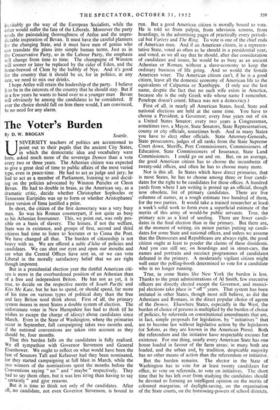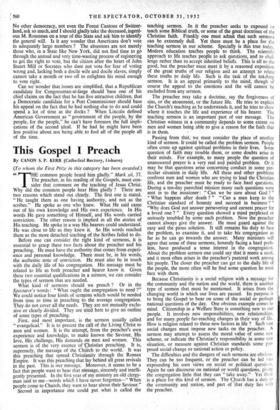The Voter's Burden
NIVERSITY teachers of politics are accustomed to point out to their pupils that the ancient City States, in which the democratic idea and vocabulary were born, asked much more of the sovereign Demos than a vote every two or three years. The Athenian citizen was expected to give a great deal of time to public affairs of the most varied type, even in peace-time. He had to act as judge and jury; he had to act as a member of Parliament, listening to and decid- ing on the policies advocated by Winston Pericles or Cleon Bevan. He had to double in brass, as the American say, as a dramatic critic, decide whether Christopher Sophocles or Tennessee Euripides was up to form or whether Aristophanes' latest version of Itma justified a prize.
In short, the citizen of the first democracy was a very busy man. So was his Roman counterpart, if not quite as busy as his Athenian forerunner. This, we point out, was only pos- sible on a basis of slavery. The leisure, if not the welfare, State was in existence, and groups of first, second and third citizens had time to listen to Socrates or to Cinna the Poet. We have changed all that. The burden of citizenship is not heavy with us. We are offered a table d'hene of policies and candidates. We can shut our eyes and open our mouths and see what the Central Offices have sent us, or we can vote Liberal in the morally satisfactory belief that we are right though impotent.
But in a presidential election year the dutiful American citi- zen is more in the overburdened position of an Athenian than of a free and independent Briton. He has not as yet, it is true, to decide on the respective merits of South Pacific and Kiss Me Kate, but he has to spend, or should spend, far more of his time on various types of political duty than the free and lazy Briton need think about. First of all, the primary system means in most States a double system of election. The unfortunate voter in New Hampshire has had to think (if he wishes to escape the charge of idiocy) about candidates since March. Even in the State of Washington,,wherg the primaries occur in September, full campaigning takes two months and, if the national conventions are taken into account as they should be, four months.
That this burden falls on the candidates is fully realised. We all sympathise with Governor Stevenson and General Eisenhower. We ought to reflect on what would have been the fate of Senators Taft and Kefauver had they been nominated, for they started campaigning at full blast in March, while the two winners of the nominations spent the months before the Conventions saying " no " and " maybe " respectively. They had to say them often, but it was less tiring than having to say " certainly " and give reasons. But it is time to think not only of the candidates. After all, -no candidate, not even Governor Stevenson, is bound to run. But a good American citizen is morally bound to vote. He is told so from pulpits, from television screens, from hoardings, in the advertising pages of practically every periodi- cal but Variety and The Ring. To vote is one of the chief ends of American man. And if an American citizen, in a represen- tative State, voted as often as he should in a presidential year, and voted, as we all say that, he should, after due consideration of candidates- and issues, he would be as busy as an ancient Athenian or Roman, without a slave-economy to keep the ordinary business of life going. And so would the female American voter. The American citizen can't, if he is a good citizen, leave all the domestic economy of American life to the equivalents of Calpurnia or Xanthippe. (I only use the last name, despite the fact that no such wife exists in America, because she is the only Greek wife whose name I remember. Penelope doesn't count; Ithaca was not a democracy.) First of all, in nearly all American States, local, State and national elections are held at the same time. You have to choose a President, a Governor; every four years out of six a United States Senator; every two years a Congressman, sometimes two, a Mayor, State Senators, State Representatives, county or city officials, sometimes both. And in many States you have to elect other officials. State Attorney-Generals, State prosecutors, judges of all ranks from the State Supreme Court down, Sheriffs, Port Commissioners, Commissioners of Education, State Commissioners of Insurance, State Land Commissioners. I could go on and on. But, on an average, the good American citizen has to choose the incumbents of twenty-odd offices, and often he has to choose many more.
Nor is this all. In States which have direct primaries, that is most States, he has to choose among three or four candi- dates for the right to be candidates for these offices. A hundred yards from where I am writing is posted up an official, though now obsolete, list of primary candidates. There are five columns of names, at a rough estimate two hundred of them, for the two parties. It would take a trained researcher at least a week's solid work to form even a superficial estimate of the' merits of this army of would-be public servants. True, the primary acts as a kind of seeding. There are fewer candi- dates in the final election than in the primary. But there are, at the moment of writing, six minor parties putting up candi- dates for some State and national offices, and unless we assume that the Democrats and Republicans are always right, the good citizen ought at least to ponder the claims of these dissidents. And you can still see, on hoardings and in street-cars, the names and portraits and succinct programmes of candidates defeated in the primary. A moderately vigilant citizen might well enter the polling-booth determined to vote for a candidate who is no longer running.
True, in some States like New York the burden is less. Thanks to the great administrations of Al Smith, few executive officers are directly elected except the Governor, and munici- pal elections take place in " off " years. That system has been imitated in other States, though most still believe, as did the Athenians and Romans, in the direct popular choice of agents of the Demos. Elsewhere States, especially in the West, the burden of choice of persons is multiplied by the burden of choice of policies, by referenda on constitutional amendments that are, in fact, simple proposals for legislation, by " initiatives " that are to become law without legislative action by the legislators (or Solons, as they are known in the American Press). Both the referendum and the initiative have respectable excuses for existence. For one thing, nearly every American State has one house loaded in favour of the farm areas; in many both are loaded, and the urban and, by tradition, despicable majority has no other means of action than the referendum or initiative.
But the burden remains. The elector in the State of Washington has to vote for at least twenty candidates for office, to vote on referenda, to vote on initiatives. The short time that he has left over from studying the candidates should be devoted to forming an intelligent opinion on the merits of coloured margarine, of daylight-saving, on the organisation of the State courts, on the borrowing-powers of school districts. No other democracy, not even the Forest Cantons of Switzer- land, ask so much. and I should gladly take the deceased, ingeni- ous M. Rousseau on a tour of this State and ask him to identify the general will. Is it any wonder that Americans don't vote in adequately large numbers ? The absentees are not merely those who, in a State like New York, did not find time to go through the annual and very time-wasting process of registering to get the right to vote, but the citizen after the heart of John Stuart Mill or Socrates who dare not vote for fear of voting wrong and, lacking both a docile wife and docile slaves, simply cannot take a month or two off to enlighten his mind enough to vote right.
Can we wonder that issues are simplified, that a Republican candidate for Congressman-aWarge should 'base one of his chief claims on the fact that he has five attractive children, that a Democratic candidate for a Port Commissioner should base his appeal on the fact that he had nothing else to do and could spend a lot of time at the docks ? When Lincoln defined American Government as " government of the people, by the people, for the people," he can't have foreseen the full impli- cations of the second ideal. If he had he might have been less positive about not being able._ to fool all of the people all of the time.



































 Previous page
Previous page